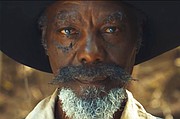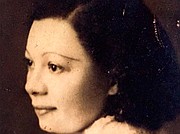Maati Joan Prim is featured in “Minor Setback, Major Comeback,” a student-produced film that will screen at this year’s Crossroads Film Festival. Photo courtesy Crossroads Film Society
The Big Clay Booom by Amber Helsel
"Big BoooM" looks at Earth's creation and evolution over time through an unconventional method: Claymation.
The film begins with a gray, black and white blob breathing in and out, which then blasts into thousands of smaller pieces, and eventually, the Earth appears, going from barren planet to one covered with greenery and water. It then shows the planet over time—from plant life forming to animals evolving to the Ice Age to humans evolving to the creation and progression of civilization.
This film's soundtrack that progresses from an atmospheric melody to light and playful accordion music that plays faster and louder as civilization progresses makes the film pack an even bigger punch. "Big BoooM" is a creative insight into the history of our planet and our potential future.
The film will show during the "Animation Station" block on Saturday, April 14, at 1 p.m. on screen A.
Haunted by 'Black Canaries' by Mike McDonald
In the 20th century, coal miners carried canaries into mines to detect toxic gases such as carbon monoxide. If the bird died, it alerted the miners to seek refuge or wear a respiratory device.
"Black Canaries," which is based on writer, producer and director Jesse Kreitzer's coal-mining ancestry, tells the story of a man, Clarence Lockwood, who used the apiary safety tool once, but the trick was ineffective. He survived a mine accident, and his father fell ill and one of his sons became blind because of it. The narrator, Lockwood's other son, says in the beginning: "Hard to say what kept him going. ... After the mine collapse, he swore that the land was still rich."
Still, he continues to mine. Coal beckons to him, not as a cold, inanimate object, but a material very much alive, on fire, glowing in his hands in a vision or reminding him of that fateful day, as well as the power of the resource through the iron grates on his fireplace, emanating warmth day and night.
He is drawn to coal, ignoring that it nearly killed him and hurt his family.
The film is rich in tempered hues, mostly grayscale. The family lives in a one-room cabin, which makes the death of the grandfather more pervasive. The cabin is in a field, windswept and surrounded by tall grass and alfalfa.
The narrator's voice, combined with the music, is haunting and sobering, reflecting this hardscrabble lifestyle where survival is a daily enterprise.
Crossroads Film Festival will show "Black Canaries" on Saturday, April 14, at 1:30 p.m. during the "Global Snapshots" block on Screen C.
The Cinema of Sound by Micah Smith
As diverse as this year's Crossroads Film Festival entries are, few individual blocks pack as many different styles in one as the music video showcase. Festivalgoers can check out visuals for rock, country, Americana, and even fife-and-drum blues music from the Jackson metro area and all corners of the country. Here's a list of what you can expect to see (and hear).
"Damaged": American Automatic
"Sentimental": Cheshi
"Glory, Glory": Sharde Thomas and the Rising Star Fife and Drum Band
"Manna": King Woman
"My Golden Rule": Melissa Gail Klein
"Serve All": Stace & Cassie
"Till I Cross Your Mind": Young Valley
"Bubblewrap": Baron Von Rumblebuss
"Class Dismissed": Too Many Vices
"A Hard Rain": Stace & Cassie
"Moss Point, Mississippi" Don Smith
"World Gone Crazy,": 61 Ghosts
"How Much": Ormond White
Crossroads Film Festival's music video showcase is on screen A at 8 p.m. on Friday, April 13 .
A Life of 'Compartments' by Mike McDonald
Humans have a tendency to compartmentalize experiences, people, relationships and memories when dealing with trauma, or to simply manage circumstances in life.
This phenomenon is present in the animated film "Compartments." In the film, which uses paper-doll-esque animation, the characters have a bookshelf on their chests that represent their lives: family history, life experiences, culture and everything in between.
"Compartments" is an animated film project from Daniella Koffler and Uli Seis. It is about a young woman, Netta, who wants to move to Germany, although her father, a son of Holocaust survivors, has warned her about the evils of the German people for her entire life.
After meeting a man, Netta moved to Germany, and her father will not talk to her. When the film opens, she receives a package from her father. "Compartments" follows her as she contemplates opening the package as she thinks about her past. Both she and her father have to find ways to deal with their demons to save their relationship.
The animation style of the film fits the film's theme of reconciling one's past with the future. "Compartments" also hits on themes such as loss, history, personal and cultural identity, generational differences and human behavior.
"Compartments" will show on Saturday, April 14, during the "Animation Station" film block on screen A.
Dear Mr. Bryant by Amber Helsel
Gov. Phil Bryant signed House Bill 1523, which protects certain "sincerely held religious beliefs" from government discrimination, into law on April 5, 2016, amid outcries among civil- and human-rights groups, people across the state, businesses and even some faith leaders in Mississippi.
Filmmaker Jenni Smith told the Jackson Free Press in February that she and fellow filmmaker Robbie Fisher wanted to be part of the response, so they decided to create a film that would tell a different story than the one legislators are telling.
"We knew that all of Mississippi didn't think this way, and that (a lot) of Mississippi was aware of the dangers of these types of laws and the problems with them, so we reached out to a couple of people, and the response that we got from faith leaders in Mississippi was just very uplifting," she said.
Smith, Fisher and the rest of the team shot "Dear Mr. Bryant" entirely on an iPhone. The filmmakers interviewed 17 faith leaders and followers of Christian, Jewish and Muslim traditions, including Rev. Ronnie Crudup Jr. of New Horizon Ministries, local philanthropist Bilal Qizilbash and Rev. Paige Swaim-Presley, executive director of Millsaps College's Center for Ministry.
The film opens with a choir crooning the lyrics of Tena Rix Clark's "My, My Mississippi," then fades into a title card that cites data Williams Insitute shows that Mississippi's LGBT community is 60,000 strong, and the state ranks No. 1 in the nation on same-sex couples raising children. Throughout the film, each person in the film speaks on their disdain for HB 1523 against the same background.
"Dear Mr. Bryant" reads just like the name sounds: like a letter to Gov. Phil Bryant, and legislators and state leaders who support HB 1523.
"Dear Mr. Bryant" will screen during the "Wonder Women: Stories by Female Filmmakers" film block on Saturday, April 14, at 3:15 p.m., on screen B.
Steps Forward from 'Setback' by Micah Smith
"Minor Setback, Major Comeback: Supporting Black Dollars and Businesses in Jackson, Mississippi" may begin with a quick look at the past, but its perspective is all about keeping an eye toward the future.
After a jovial voiceover from one of the three young filmmakers, the short, which students in the Mississippi Youth Media Project created, launches into interviews with residents who are working to stimulate growth on Farish Street, once a vibrant black business district in Jackson that fell into decay in the decades since legal segregation ended..
"Minor Setback" introduces viewers to Marshall's Music & Bookstore owner Maati Joan Prim, Johnny T's Bistro & Blues owner John Tierre and David Mosley, chairman of organization Respect Our Black Dollars. The film contrasts the vibrant interiors of their businesses with shots of shuttered storefronts in the once-booming neighborhood, but it is clear that the filmmakers are most interested in providing a path forward.
The short seeks to inspire viewers to be active in the development of not just Farish Street but the black-owned business community as a whole, whether it's Mosley stressing the importance of people of color engaging in local economic growth or Prim discussing the need to provide quality services to customers and push past infrastructure issues to succeed.
While "Minor Setback" could have benefited from a consistent visual style, it is a solid call to action for Jackson's future.
"Minor Setback, Major Comeback" will screen during the "Lindy Lou" block on Saturday, April 14, at 7:45 p.m. on screen B.
A Man and A Teddy Bear by Amber Helsel
A black man runs through a thick forest, shotgun in his hand. Three dogs run alongside him, barking and growling. Suddenly, the man stops, aims his gun and shoots. Amid the smoke, the words "Holt Collier" appear on the screen.
The film, "Holt Collier," which Heather D. Mathews produced, tells the story of Collier, a famed hunter who killed more than 3,000 bears in his lifetime. Collier's family members were slaves at Howell Hinds' Home Hill Plantation. At the age of 10, Hinds brought him to the family's Plum Ridge Plantation in Washington County, where he first learned to shoot. Four years later, he ran away to join his master, Howell Hinds, and Hinds' son Thomas in the Confederacy. At one point he ended up shooting on the front lines. Collier later rode with the 9th Texas Cavalry until the end of the war. After Hinds died, Collier returned to his home in Greenville.
Over the years, Collier had become such a famous hunter that President Theodore Roosevelt wanted him to be his tracker while bear hunting. In the woods of Sharkey County in Rolling Fork, Miss., Collier told Roosevelt and Major George M. Helm to sit and wait while he looked for a bear. When Collier cornered a bear near the site, the two were nowhere to be found. Instead of killing the bear, he knocked it unconscious, and then lassoed it and tied it to a tree. When Roosevelt came back, he saw the bear, but because news reporters were among the entourage, he decided not to shoot it. The incident made headlines. In one political cartoon, "Drawing the line in Mississippi," cartoonist Clifford Berryman drew the bear as a cub—a Teddy bear.
The film features interviews from people such as author Minor Buchanan and Roland Hurts, the director of the Delta Center for Culture and Learning at Delta State University. Along with interviews, the film also features reenactments of scenes from Collier's life, including him hunting and of the 1902 hunt with Roosevelt, and even some animation.
"Holt Collier" will show during the "Afro-Centric Cinema: International Black Film Collective" film block on Friday, April 13, at 6:15 p.m. in screen B.
Cue music and ... action! by R.H. Coupe
"Hard Way—The Action Musical" is a tongue-in-cheek movie that blends together several film genres that people may not generally think are compatible. Think "Mad Max" breaking into song and dance a la "The Greatest Showman," or maybe a bit more like "The Rocky Horror Picture Show." The film follows the main character, Jake, as he and his S.W.A.T. team raid an abandoned factory to take down a terrorist, all while singing and dancing.
The student film's action takes place in Detroit, but the filmmakers actually shot it in Germany. Most of the main actors are fairly well-known, including Hannah Britland, who plays Abigail in Netflix series "Lovesick," and Charlie Anson, who plays Mr. Hurst in "Pride & Prejudice & Zombies."
The movie is something for everyone: A love story (unrequited love that is eventually reconciled), a literal battle between the sexes, and between order and disorder, singing and dancing, suspense and surprise, and even some violence with singing and dancing in the end. I suspect "Hard Way—The Action Musical" will have a cult following. The film is definitely worth a view.
"Hardway—The Action Musical" will show on Saturday, April 14, at 5:30 p.m. during the "Comedies II: Extra Dark Roast" on screen A.
Of Earthquakes and Goodbyes by R.H. Coupe
A grandmother sings a lullaby to an unseen child in a swinging bassinet. Then, the scene goes dark with the sounds of debris falling and then a crying baby.
"Ananta Yatra (The Eternal Journey)," which Sunil Pandey directed, is set in Nepal during the devastating 2015 earthquake that killed nearly 9,000 people and injured about 22,000. Pandey created the film as a eulogy to his grandmother who died during the earthquake.
"The Eternal Journey" is an eerie movie with few spoken words, subtitled into English, and no background music—just the sounds of the wind, birds, the earthquake and the rustle of water.
After the screen goes dark, the picture returns with the grandmother, who is dressed differently now, sitting calmly looking out the window at a desolate landscape with the room askew, and the baby crying. Then begins her "eternal journey." The film follows her journey as her grandson says goodbye, and she has to get across the Baitarani River in her path to afterlife.
"The Eternal Journey" is a film worth watching for its insight into another culture and how it resonates with our own beliefs.
"Ananta Yatra (The Eternal Journey)" will show on Saturday, April 14, during the "Global Snapshots" film block at 1:30 p.m. on Screen C.
Medgar Evers' Legacy by Mike McDonald
"Where Medgar Evers Lives Today" ponders the idea of where Medgar Evers' legacy resides. To Jacksonians and Mississippians generally, Evers may live in his old office on Farish Street, or his home on Margaret Walker Alexander Drive where he was assassinated, and also in every town in the state where he wished for a desegregated future.
Though the film does not definitively answer that question, it contends that one place Evers may live is at his namesake library on Medgar Evers Boulevard near Freedom Corner.
The film features interviews with the library director, Anne Sanders, and its diverse patrons. They talk about how the library embodies the legacy and civil-service mission that Evers dedicated his life to and why the library serves as an integral part of the community.
Several interviewees in the film say that events and programs at the library bring together people from surrounding neighborhoods. They fester a coalition of humanity centered around common goals like educational attainment and social well-being, which would make Evers proud if he were alive today. Both young and old in the film believe that Eves serves as a role model for what one person can achieve when he or she is focused on the betterment of others and society.
"Where Medgar Evers Lives Today" will show during the "Fighting for Social Justice" film block on Saturday, April 14, at 1:15 p.m. on screen B.
Nellie Jackson, 'Mississippi Madam' by Mike McDonald
Communities across the United States contain colorful characters, both past and present. Certain professions may attract these types of personalities more than most, such as becoming a madam or lady of the evening.
"Mississippi Madam: The Life of Nellie Jackson" tells the story of Nellie Jackson, who ran a brothel called Nellie's at 416 N. Rankin St. in Natchez.
The film begins with Jackson's great-niece, Nellie Howard, walking around the old house, now vacant and succumbing to the elements, detailing how the house looked and the activities that would happen in different rooms. For example, in the kitchen, a long wooden table stood in the center, and Howard would often cook breakfast for "her girls" in the morning, using leftover bacon grease with cornmeal to feed the dogs after the food was served.
From pictures in the film, viewers can see that Jackson decorated the house like a grandmother's home, with bulky stained wood furniture, pictures in frames on the walls and antique trinkets on bookshelves.
All interviewees (some with a sheepish grin) state that everyone knew the business dealings at 416 North Rankin, yet did not care. Jackson was popular. She provided young women from the region and midwestern states with a job, and kept a firm grip on the rules in the house, brandishing a pistol when needed and handling rowdy customers on her own without the need for law enforcement. In fact, politicians and lawmen alike allowed Jackson to conduct her business, believing her presence in Natchez was just another part of the checkered history in this old river town.
"Mississippi Madam: The Life of Nellie Jackson" will show during the film block of the same name on Friday, April 13, at 8:15 p.m. on screen B.
Read more at jfp.ms/crossroads2018.
CORRECTION: The "Black Canaries" blurb has been edited to reflect a change. Mike McDonald, not R.H. Coupe, wrote the piece.












Comments
Use the comment form below to begin a discussion about this content.
comments powered by Disqus